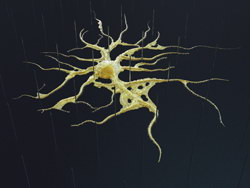Novel compounds against neurodegeneration
Accumulating evidence suggests that neuronal cell adhesion molecules play key roles in learning and memory. They also have a very broad distribution in the nervous system rendering them ideal targets for drug development. Their modes of action are mediated by intracellular signalling cascades and regulation of cell–cell and cell–extracellular matrix adhesion, ultimately affecting neural plasticity. The key objective of the EU-funded Promemoria project was to study the role of cell recognition processes in normal and dysfunctional plasticity, learning and memory. The goal was to develop compounds with a beneficial effect on diseases involving cognitive impairment. Consortium partners discovered new genes and proteins, identified novel pathogenic mechanisms and defined new therapeutic strategies for modulating synaptic plasticity in order to improve learning, memory and regeneration. Over 30 patents were granted concerning compounds with a beneficial effect on learning and memory impairment in Alzheimer's disease. Some of these were submitted for determination of pharmacokinetics and toxicology, while others were tested in phase I clinical trials. Interfering with cell adhesion molecules in the nerve system proved a valid approach for modulating cognition and learning impairment. Based on the knowledge achieved through the preparation of cell adhesion molecule-related compounds, new biotech enterprises were founded for the development of compounds for the treatment of inflammation, neurodegeneration and cancer.

